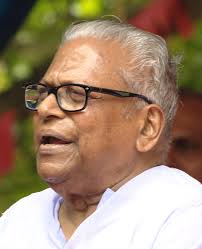The Political Influence of Vs Achuthanandan

Introduction
Vs Achuthanandan, a prominent leader of the Communist Party of India (Marxist), has been a significant figure in Kerala’s political landscape for decades. His unwavering stance on various social issues and relentless efforts for the underprivileged have drawn attention to his political journey, making him a relatable icon among the masses in Kerala. The relevance of Achuthanandan’s contributions is particularly highlighted in the current political climate, where his legacy continues to challenge and inspire the younger generation of politicians.
Political Career and Milestones
Born on October 20, 1923, in Attyipra, Kerala, Achuthanandan’s political career commenced in the late 1940s. Over the years, he has held several key positions within the Communist Party and has been an important member of the Kerala Legislative Assembly, serving multiple terms. His tenure as the Chief Minister from May 2006 to May 2011 stands out as a pivotal moment in Kerala’s governance, where he sought to implement reforms in education, health care, and land reforms.
Despite facing adversities, including internal party conflicts, Achuthanandan’s ability to connect with the electorate remains strong. His fight against corruption and support for transparency in government practices have contributed to his reputation as a leader who prioritizes public welfare above all.
Recent Developments and Significance
In recent events, Achuthanandan’s legacy was revived during the CPI(M) state committee meetings discussing new leadership roles and upcoming elections. As the party gears up for a critical electoral battle, Achuthanandan’s experience and wisdom are seen as vital assets. His views on current socio-political issues and challenges faced by the party have resonated strongly, reinforcing his position as a guiding force for younger leaders.
Moreover, his stance on environmental issues and sustainable development aligns with global movements towards a greener future. He has been vocal about climate change impacts in Kerala, advocating for policies that prioritize ecological preservation. This resonance with contemporary issues highlights the lasting relevance of Achuthanandan’s principles in shaping future policies.
Conclusion
The enduring influence of Vs Achuthanandan in Kerala’s politics cannot be understated. As Kerala approaches another electoral cycle, his insights and experiences will likely play a crucial role in shaping the future of the state. For the wider audience interested in political affairs, Achuthanandan’s career illustrates the power of grassroots leadership and the importance of integrity in governance. The political narrative in Kerala continues to evolve, and figures like Achuthanandan represent the historical ideals that still hold sway over the present and future political discourse.







